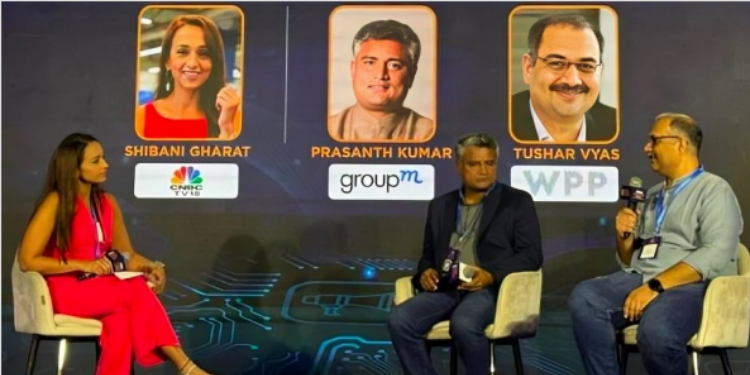Mumbai: Reinvention of what brands, agencies do in the age of AI is crucial. It is important to experiment and have fun. While change is not new to the advertising and marketing industry one thing that keeps changing in AI is the pace of change and the contours of change. So innovation is required to provide value to customers. The goal should be to use AI to improve a campaign done so that it is much better compared to the previous one. The industry will thus learn from this. WPP Open plays an important for WPP when it comes to leveraging AI. WPP is building five pillars when it comes to leveraging AI. It has important partnerships with companies like NVidia and Google. It has a future readiness academy to allow employees to learn about AI. Some of them in this way get specialised skills. For WPP providing solutions through AI is both challenging and exciting.
These remarks were made during a fireside chat on AI Marketing Maturity Model – Life Stages And the Indian Context at MMA India’s Impact India 2024 Summit. The speakers were GroupM CEO South Asia Prasanth Kumar who is also MMA India co-chair and Group M South Asia president, WPP India chief strategy officer Tushar Vyas. The moderator was CNBC TV anchor Shibani Gharat.
The theme of the Summit was ‘Marketing in the Age of AI – Inspire, Innovate, Integrate’ and the aim was to transcend the conventional, urging stakeholders to reimagine the fabric of marketing strategies through the lens of AI. Kumar noted that his agency has multiple discussions with clients. If it is a CFO the conversation steers towards how much it costs. But he noted that it is important to first invest, get things ready and then benefit. Clients raise questions of how they can use it, where does it help? How do they do it? The good news according to him is that clients are opening up to it. Some clients look at focussing on putting together a task team on it. They feel that being AI ready will give them a competitive advantage.
When asked by Gharat about concerns raised by clients regarding AI he mentions the usage of it and compliance of AI. Boundaries are a matter of concern. He noted that companies need to have a Governance Compliance Team to take care of the dos and don’ts. It is a constant improvisation model and so it needs a lot more attention. This he said is a concern. Skilling of people is another concern.
Vyas spoke about the role of WPP Open and 35,000 people have benefited from it. It allows the agency to integrate AI into day to day work and provide better services to clients. He mentioned the five pillars that WPP is working on. He noted the importance of connecting the right amount of data whether it is from the ecosystem, the clients.
You have to create the right, quality ecosystem. He spoke about the Future Readiness Academy so that employees learn AI for day to day implementation of tasks. Some people can thus get specialised skills at various levels. Another pillar is partnerships with companies like NVidia, Google. The aim is to build something for the industry. Last year WPP announced a partnership with NVidia to build generative AI-enabled content engine for digital advertising. It also has a partnership with Google Cloud. He noted that some partnerships have been running for years. The NVidia partnership is about enterprise content generation at scale.
When it comes to deployment of media Kumar noted that co-pilot is a tool that helps with more precision of reaching consumers of probability. It allows for more precise targeting of audiences. A lot of time is spent on studying audiences before deploying the tool and targeting them. This can be done faster and in real time. Another aspect is about customising content from a cohort basis. You get insights on how cohorts behave and after that you come out with multiple pieces of content which are targeted into multiple cohorts. Technology helps with this. Some of this content is co-created and some of this is done through partners.
When asked about the challenges that AI solves Kumar mentioned three areas. Firstly it helps in campaign management. Post pandemic spends have been skewed towards digital and a lot more factors and variables have come into it. A lot of data is available and it is about applying it. Nexus has a team that works on this. Secondly, it has helped in the agency’s Consulting Practices. Also it is not only about efficiency. People are able to think better and look into other multiple areas through AI.
When asked about pressure coming from the client side to use AI to ensure faster outcomes and reduce costs he admitted that this is there. The world today focusses on having high growth while keeping the costs low. Technology has the ability do things in an effective manner. Everyone wants to maximise that. A job can be finished faster in real time and one can do it with fewer people. “Everyday something is happening.” The goal should be to learn and use it for the next campaign. This process is continuous. He said that it is good to have conversations about pressures and delivering outcomes.
He said that through AI he would like to ensure that as a media practitioner he is able to progress the customers outcomes and be objective to the task that the customer has given. Improve every campaign so that it is better than the previous one. The more important thing is that more people should practice this and thus there can be learnings for the industry.

















